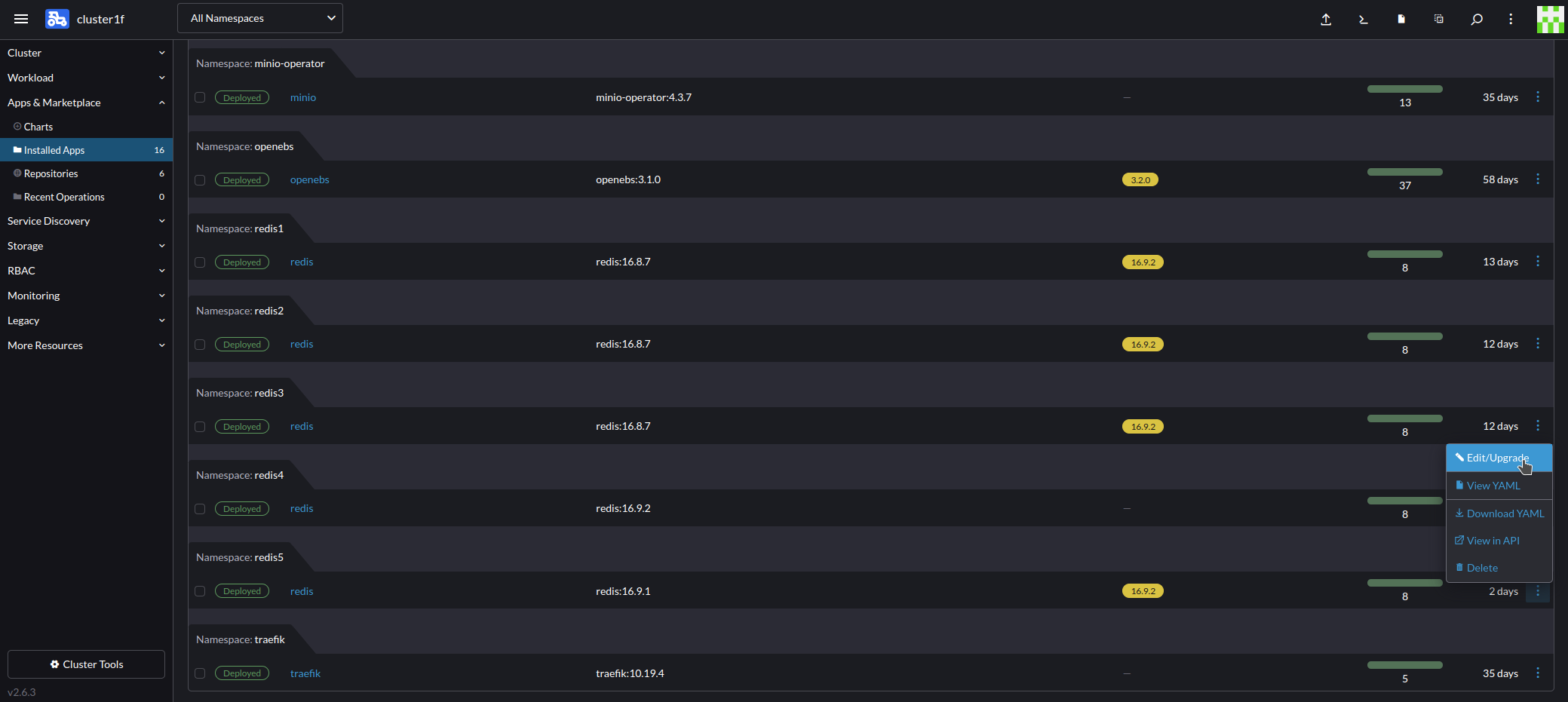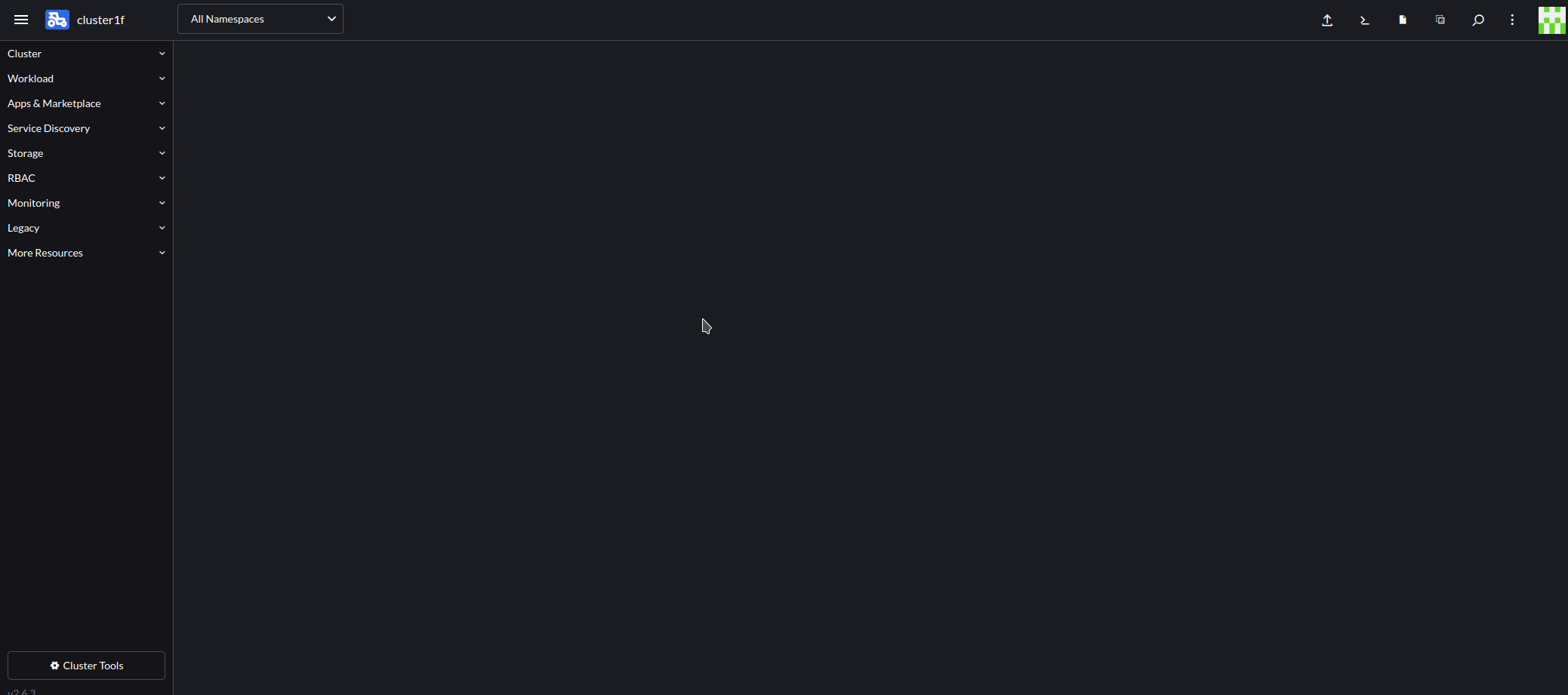New issue
Have a question about this project? Sign up for a free GitHub account to open an issue and contact its maintainers and the community.
By clicking “Sign up for GitHub”, you agree to our terms of service and privacy statement. We’ll occasionally send you account related emails.
Already on GitHub? Sign in to your account
Rancher Helm corrupts Helm values.yaml leading to broken applications and doesn't handle upstream changes #35717
Comments
|
Another issue with Rancher's Helm implementation: I made several changes to the Helm values, but they got lost after another edit operation. |
|
There's something really weird going on with Rancher 2.6.2's Helm UI. Possibly some kind of client-side state related issues or how the server side handles changing values from the upstream repo. I've attempted to change values and when I saved a completely different area of the values changed and corrupted the values. I just did a test where I saved the values that I saw in the Rancher UI, then hit update, then looked at what Rancher shows in the values tab and there were differences: Here's a snippet of the diff between what I saved vs what Rancher seems to have applied. Rancher is corrupting the values and I can't safely make any changes to a Helm application now. |
|
After further investigation, I do believe the issue is because Rancher is merging array values which is not safe to do without semantic understanding of the values. Example, if you have an upstream repo that has something like this: and you make changes, and/or rearrange them (which is a entirely valid change to make as a user) Then rancher will incorrectly merge these and it'll look like: Rancher doesn't seem to have any semantic understanding of the values, thus it seems to just merge things based on array index. I think the solution should be something like:
|
|
This issue is definitely not limited to just this one helm application. I just hit it on yet another Helm template that included arrays. |
This is wild, was so confused when we upgraded to 2.6.3. Is previous behaviors with values going to be restored? |
|
This repository uses a bot to automatically label issues which have not had any activity (commit/comment/label) for 60 days. This helps us manage the community issues better. If the issue is still relevant, please add a comment to the issue so the bot can remove the label and we know it is still valid. If it is no longer relevant (or possibly fixed in the latest release), the bot will automatically close the issue in 14 days. Thank you for your contributions. |
|
Still happening |
|
Confirmed that Rancher 2.6.5 still incorrectly handles YAML values. @jonathon2nd, totally agree on the user experience for these values. I gave some ideas above, but I want to see some clearer diffing to show what I actually changed vs what changed upstream. |
|
This repository uses an automated workflow to automatically label issues which have not had any activity (commit/comment/label) for 60 days. This helps us manage the community issues better. If the issue is still relevant, please add a comment to the issue so the workflow can remove the label and we know it is still valid. If it is no longer relevant (or possibly fixed in the latest release), the workflow will automatically close the issue in 14 days. Thank you for your contributions. |
|
Still broken v2.6.6 |
|
Trying to comment again because it's still marked as stale. But Rancher's helm handing is still buggy. |
|
Yeah, we are switching to Argo. Manual setup with helm cli for infra, Argo for our deployments. |
|
This repository uses an automated workflow to automatically label issues which have not had any activity (commit/comment/label) for 60 days. This helps us manage the community issues better. If the issue is still relevant, please add a comment to the issue so the workflow can remove the label and we know it is still valid. If it is no longer relevant (or possibly fixed in the latest release), the workflow will automatically close the issue in 14 days. Thank you for your contributions. |
|
Still broken on v2.6.8 |
|
@ajacques We have so far had great success with Argo-cd. We are currently setting up new infra and clusters, and all non cluster charts are managed by Argo-cd. We are managing both infrastructure (metallb, storage CSI, and a few others) as well as applications and their dbs. May not be what you are looking for, but so far we are happy. The automatic syncing and updating of our applications is a bonus. We are still in the early stages, could let you know in a couple months how it is going. |
|
This repository uses an automated workflow to automatically label issues which have not had any activity (commit/comment/label) for 60 days. This helps us manage the community issues better. If the issue is still relevant, please add a comment to the issue so the workflow can remove the label and we know it is still valid. If it is no longer relevant (or possibly fixed in the latest release), the workflow will automatically close the issue in 14 days. Thank you for your contributions. |
|
@jonathon2nd Thanks for the update. I've been meaning to try out ArgoCD, but haven't yet and keep this open in the futile hope that Rancher will fix this bug. Maybe I'll find some time over the holidays to try out ArgoCD. |
|
This repository uses an automated workflow to automatically label issues which have not had any activity (commit/comment/label) for 60 days. This helps us manage the community issues better. If the issue is still relevant, please add a comment to the issue so the workflow can remove the label and we know it is still valid. If it is no longer relevant (or possibly fixed in the latest release), the workflow will automatically close the issue in 14 days. Thank you for your contributions. |
|
bump |
|
This repository uses an automated workflow to automatically label issues which have not had any activity (commit/comment/label) for 60 days. This helps us manage the community issues better. If the issue is still relevant, please add a comment to the issue so the workflow can remove the label and we know it is still valid. If it is no longer relevant (or possibly fixed in the latest release), the workflow will automatically close the issue in 14 days. Thank you for your contributions. |
|
bump still broken 2.7.1 |
|
This repository uses an automated workflow to automatically label issues which have not had any activity (commit/comment/label) for 60 days. This helps us manage the community issues better. If the issue is still relevant, please add a comment to the issue so the workflow can remove the label and we know it is still valid. If it is no longer relevant (or possibly fixed in the latest release), the workflow will automatically close the issue in 14 days. Thank you for your contributions. |
|
Bump. Still broken in v2.7.3 |
|
This repository uses an automated workflow to automatically label issues which have not had any activity (commit/comment/label) for 60 days. This helps us manage the community issues better. If the issue is still relevant, please add a comment to the issue so the workflow can remove the label and we know it is still valid. If it is no longer relevant (or possibly fixed in the latest release), the workflow will automatically close the issue in 14 days. Thank you for your contributions. |
|
Bump. v2.7.5 |
|
This repository uses an automated workflow to automatically label issues which have not had any activity (commit/comment/label) for 60 days. This helps us manage the community issues better. If the issue is still relevant, please add a comment to the issue so the workflow can remove the label and we know it is still valid. If it is no longer relevant (or possibly fixed in the latest release), the workflow will automatically close the issue in 14 days. Thank you for your contributions. |
|
Still broken in v2.7.8 |
|
Lmao just realized I never updated this. We have been using Argo-CD for all of our deployments without issue. |
|
This repository uses an automated workflow to automatically label issues which have not had any activity (commit/comment/label) for 60 days. This helps us manage the community issues better. If the issue is still relevant, please add a comment to the issue so the workflow can remove the label and we know it is still valid. If it is no longer relevant (or possibly fixed in the latest release), the workflow will automatically close the issue in 14 days. Thank you for your contributions. |
|
Still broken 2.8.1 |
|
Not stale bump |
|
still happened in 2.8.2. I deploy helm chart: argocd-apps, parameters in chart is empty, and overwrite them in rancher ui. applications:
- source:
helm:
parameters:
- name: na
value: ''
- name: nc
value: ''after: applications:
- source:
helm:
parameters:
- name: na
value: ''
- name: nb
value: ''
- name: nc
value: ''rancher display values: applications:
- source:
helm:
parameters:
- name: na
value: v1
- name: nc
value: v3after: applications:
- source:
helm:
parameters:
- name: na
value: v1
- name: nc
value: v3
- name: nc
value: '' |



Rancher Server Setup
Information about the Cluster
Describe the bug
In Rancher 2.6 (as opposed to how 2.5 and before behaved) I now have to explicitly provide all values, even values that I don't change. Thus when an upstream repository changes their values, I don't get the newest changes, and I don't seem to have any way to actually see that the upstream changed values, without seeing a bug or manually investigating. Instead, my explicit values are carried forward through every Helm upgrade without knowing which ones to merge.
There's been what seems like several regressions in the UX for Helm applications. This issue is actually a major trust buster for me since I can no-longer trust that Rancher is going to be able to safely upgrade a Helm upgrade.
To Reproduce
serverFiles.prometheus.yml.scrape_config:from the defaultAdditionally, if I try to delete the value from the values.yaml view hoping for Rancher to fallback to the 2.5 behavior, it just proceeds with an empty value, breaking the application.
Result
Expected Result
Screenshots
Additional context
Possibly related to some other Helm issues I've had: #35236
The text was updated successfully, but these errors were encountered: